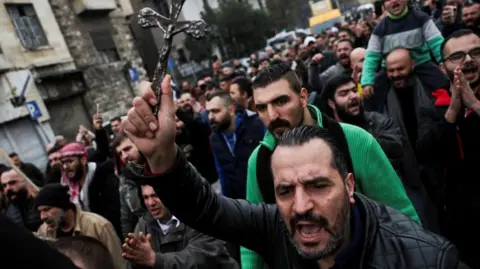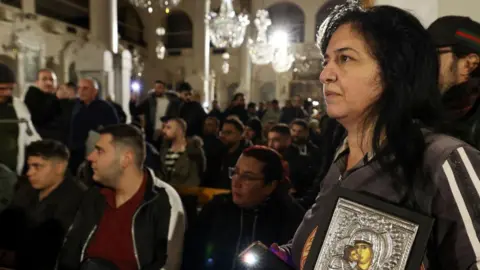Protests have broken out in Syria over the burning of a Christmas tree, prompting calls for the new Islamist authorities to take steps to protect minorities.
A video posted on social media showed the tree on fire in the main square of Suqaylabiyah, a Christian-majority town in central Syria.
Hayat Tahrir al-Sham (HTS), the main Islamist faction which led the uprising that toppled President Bashar al-Assad, said foreign fighters had been detained over the incident.
HTS representatives have promised to protect the rights and freedoms of religious and ethnic minorities in Syria.
Footage on social media appeared to show masked men dousing the Christmas tree with an unidentified liquid the night before Christians in Syria prepared to celebrate Christmas Eve. It was unclear whether they were trying to put the fire out or help it spread.
Videos of the aftermath showed a religious figure from the governing HTS rebel group assuring crowds who had gathered in Suqaylabiyah that the tree would be repaired before the morning.
The man then held up a cross in a show of solidarity, something Islamist conservatives would not normally do.
 Reuters
ReutersOn Tuesday more protesters took to the streets over the arson attack, including in parts of the capital Damascus.
Some in the Kassa neighbourhood of Damascus chanted against foreign fighters in Syria.
“Syria is free, non Syrians should leave,” they said, in reference to the foreign fighters HTS said were behind the attack.
In the Bab Touma neighbourhood of Damascus, protesters carried a cross and Syrian flags, chanting “we will sacrifice our souls for our cross”.
“If we’re not allowed to live our Christian faith in our country, as we used to, then we don’t belong here anymore,” a demonstrator named Georges told AFP news agency.
Syria is home to many ethnic and religious groups, including Kurds, Armenians, Assyrians, Christians, Druze, Alawite Shia and Arab Sunnis, the last of whom make up a majority of the Muslim population.
Just over two weeks ago, Bashar al-Assad’s presidency fell to rebel forces, ending the Assad family’s more than 50-year-rule.
Since then many displaced Syrians have begun heading back to their homes – on Tuesday, Turkey said more than 25,000 Syrians had returned to the country.
However it remains to be seen how the HTS group will govern Syria.
HTS began as a jihadist group – espousing violence to achieve its goal of establishing a state governed by Islamic law (Sharia) – but in recent years adopted a more pragmatic, less uncompromising approach.
As fighters marched to Damascus earlier this month, its leaders spoke about building a Syria for all Syrians.
On Tuesday the new authorities announced that leader Ahmed al-Sharaa had reached an agreement with “revolutionary factions… to dissolve all factions and merge them under the umbrella of the Ministry of Defence”, according to Sana news agency.
Prime Minister Mohammed al-Bashir said the ministry would be restructured to include rebel fighters.
Although the statement mentioned “all factions”, it was not clear exactly which groups are included in the merger.
There are multiple armed groups in Syria, including some opposed to HTS and others with ambiguous relationships with it at best.
 Getty Images
Getty ImagesHTS remains designated as a terrorist organisation by the UN, US, EU and UK, though there are signs that a diplomatic shift may be under way.
On Friday, the US scrapped a $10m (£7.9m) bounty on the head of HTS leader Ahmed al-Sharaa, following meetings between senior diplomats and representatives from the group.
The US is continuing its military presence in Syria. It said on Friday that it carried out an air strike in the northern city of Deir Ezzor – killing two members of the Islamic State (IS) jihadist group.
The presence of foreign fighters, Islamist extremists, or even regime supporters who have interest in causing insecurity and attacking minorities to shake the country’s stability are the big challenge that the new Islamic leadership will face.
